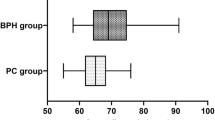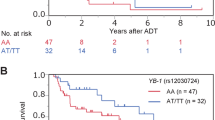Abstract
Background:
Prostate cancer (PCa) gene expression marker 1 (PCGEM1), a long noncoding RNA, has drawn increasing attention for its important role in PCa. However, the association between genetic variations in the PCGEM1 gene and risk of PCa has not been investigated yet.
Methods:
We investigated the effect of two tagging single-nucleotide polymorphism (tSNPs; rs6434568 and rs16834898) in PCGEM1 gene on PCa risk in the Chinese men. Odds ratios (ORs) with 95% confidence intervals (CIs) were used to assess the association.
Results:
We found a significantly decreased risk of PCa for rs6434568 AC and AC/AA genotype (adjusted OR=0.76, 95% CI=0.60–0.97 for AC; adjusted OR=0.76, 95% CI=0.61–0.96 for AC/AA), as well as rs16834898 AC and AC/CC genotype (adjusted OR=0.76, 95% CI=0.59–0.97 for AC; adjusted OR=0.79, 95% CI=0.62–0.99 for AC/CC), compared with the CC and AA genotypes, respectively. When we evaluated these two tSNPs together based on the risk alleles (that is, rs6434568 C and rs16834898 A), we found that the combined genotypes with four risk alleles were associated with an increased risk of PCa compared with those carrying 0–3 risk alleles (1.53, 1.19–1.97), and this increased risk was more pronounced among subjects of⩽70 years (1.80, 1.24–2.62), Gleason score⩽7 (1.68, 1.28–2.22) and PSA level⩾20 (1.64, 1.24–2.18).
Conclusions:
Our results indicated that PCGEM1 polymorphisms may contribute to PCa risk in Chinese men. Additional functional analyses are required to detect the detailed mechanism underlying the observed association.
This is a preview of subscription content, access via your institution
Access options
Subscribe to this journal
Receive 4 print issues and online access
$259.00 per year
only $64.75 per issue
Buy this article
- Purchase on Springer Link
- Instant access to full article PDF
Prices may be subject to local taxes which are calculated during checkout
Similar content being viewed by others
References
Siegel R, Naishadham D, Jemal A . Cancer statistics, 2012. CA Cancer J Clin 2012; 62: 10–29.
Jian L, Xie LP, Lee AH, Binns CW . Protective effect of green tea against prostate cancer: a case-control study in southeast China. Int J Cancer 2004; 108: 130–135.
Shao Q, Ouyang J, Fan Y, Xie J, Zhou J, Wu J et al. Prostate cancer in the senior men from rural areas in east district of China: contemporary management and 5-year outcomes at multi-institutional collaboration. Cancer Lett 2012; 315: 170–177.
Isaacs W, De Marzo A, Nelson WG . Focus on prostate cancer. Cancer Cell 2002; 2: 113–116.
Dianat SS, Margreiter M, Eckersberger E, Finkelstein J, Kuehas F, Herwig R et al. Gene polymorphisms and prostate cancer: the evidence. BJU Int 2009; 104: 1560–1572.
Moran VA, Perera RJ, Khalil AM . Emerging functional and mechanistic paradigms of mammalian long non-coding RNAs. Nucleic Acids Res 2012; 40: 6391–6400.
Mercer TR, Dinger ME, Mattick JS . Long non-coding RNAs: insights into functions. Nat Rev Genet 2009; 10: 155–159.
Costa FF . Non-coding RNAs: Meet thy masters. Bioessays 2010; 32: 599–608.
Wilusz JE, Sunwoo H, Spector DL . Long noncoding RNAs: functional surprises from the RNA world. Genes Dev 2009; 23: 1494–1504.
Huarte M, Rinn JL . Large non-coding RNAs: missing links in cancer? Hum Mol Genet 19: R152–R161.
Ifere GO, Ananaba GA . Prostate cancer gene expression marker 1 (PCGEM1): a patented prostate- specific non-coding gene and regulator of prostate cancer progression. Recent Pat DNA Gene Seq 2009; 3: 151–163.
Petrovics G, Zhang W, Makarem M, Street JP, Connelly R, Sun L et al. Elevated expression of PCGEM1, a prostate-specific gene with cell growth-promoting function, is associated with high-risk prostate cancer patients. Oncogene 2004; 23: 605–611.
Fu X, Ravindranath L, Tran N, Petrovics G, Srivastava S . Regulation of apoptosis by a prostate-specific and prostate cancer-associated noncoding gene, PCGEM1. DNA Cell Biol 2006; 25: 135–141.
Srikantan V, Zou Z, Petrovics G, Xu L, Augustus M, Davis L et al. PCGEM1, a prostate-specific gene, is overexpressed in prostate cancer. Proc Natl Acad Sci USA 2000; 97: 12216–12221.
Jin G, Sun J, Isaacs SD, Wiley KE, Kim ST, Chu LW et al. Human polymorphisms at long non-coding RNAs (lncRNAs) and association with prostate cancer risk. Carcinogenesis 2011; 32: 1655–1659.
Chen J, Wu Y, Shao P, Cao Q, Qin C, Li P et al. Association between VHL single nucleotide polymorphism (rs779805) and the susceptibility to prostate cancer in Chinese. DNA Cell Biol 2011; 31: 790–796.
Wang M, Liu F, Hsing AW, Wang X, Shao Q, Qi J et al. Replication and cumulative effects of GWAS-identified genetic variations for prostate cancer in Asians: a case-control study in the ChinaPCa consortium. Carcinogenesis 2012; 33: 356–360.
Heidenreich A, Aus G, Bolla M, Joniau S, Matveev VB, Schmid HP et al. EAU guidelines on prostate cancer. Eur Urol 2008; 53: 68–80.
Rohrmann S, Linseisen J, Allen N, Bueno-de-Mesquita HB, Johnsen NF, Tjonneland A et al. Smoking and the risk of prostate cancer in the European Prospective Investigation into Cancer and Nutrition. Br J Cancer 2012; 108: 708–714.
Zuccolo L, Lewis SJ, Donovan JL, Hamdy FC, Neal DE, Smith GD . Alcohol consumption and PSA-detected prostate cancer risk-A case-control nested in the ProtecT study. Int J Cancer 2012; 132: 2176–2185.
Barrett JC, Fry B, Maller J, Daly MJ . Haploview: analysis and visualization of LD and haplotype maps. Bioinformatics 2005; 21: 263–265.
Bialkowska-Hobrzanska H, Driman DK, Fletcher R, Harry V, Razvi H . Expression of human telomerase reverse transcriptase, Survivin, DD3 and PCGEM1 messenger RNA in archival prostate carcinoma tissue. Can J Urol 2006; 13: 2967–2974.
Verhaegh GW, Verkleij L, Vermeulen SH, den Heijer M, Witjes JA, Kiemeney LA . Polymorphisms in the H19 gene and the risk of bladder cancer. Eur Urol 2008; 54: 1118–1126.
Liu Y, Pan S, Liu L, Zhai X, Liu J, Wen J et al. A genetic variant in long non-coding RNA HULC contributes to risk of HBV-related hepatocellular carcinoma in a Chinese population. PLoS ONE 2012; 7: e35145.
Ishii N, Ozaki K, Sato H, Mizuno H, Saito S, Takahashi A et al. Identification of a novel non-coding RNA, MIAT, that confers risk of myocardial infarction. J Hum Genet 2006; 51: 1087–1099.
Schulz WA, Burchardt M, Cronauer MV . Molecular biology of prostate cancer. Mol Hum Reprod 2003; 9: 437–448.
Amanatullah DF, Reutens AT, Zafonte BT, Fu M, Mani S, Pestell RG . Cell-cycle dysregulation and the molecular mechanisms of prostate cancer. Front Biosci 2000; 5: D372–D390.
Chin L, Artandi SE, Shen Q, Tam A, Lee SL, Gottlieb GJ et al. p53 deficiency rescues the adverse effects of telomere loss and cooperates with telomere dysfunction to accelerate carcinogenesis. Cell 1999; 97: 527–538.
Young CY, Montgomery BT, Andrews PE, Qui SD, Bilhartz DL, Tindall DJ . Hormonal regulation of prostate-specific antigen messenger RNA in human prostatic adenocarcinoma cell line LNCaP. Cancer Res 1991; 51: 3748–3752.
Huang CL, Yang CH, Yeh KH, Hu FC, Chen KY, Shih JY et al. EGFR intron 1 dinucleotide repeat polymorphism is associated with the occurrence of skin rash with gefitinib treatment. Lung Cancer 2009; 64: 346–351.
Wu D, Tian Y, Gong W, Zhu H, Zhang Z, Wang M et al. Genetic variants in the Runt-related transcription factor 3 gene contribute to gastric cancer risk in a Chinese population. Cancer Sci 2009; 100: 1688–1694.
Nasiri M, Saadat I, Omidvari S, Saadat M . Genetic variation in DNA repair gene XRCC7 (G6721T) and susceptibility to breast cancer. Gene 2012; 505: 195–197.
Ban Y, Tozaki T, Taniyama M, Skrabanek L, Nakano Y, Ban Y et al. Multiple SNPs in intron 41 of thyroglobulin gene are associated with autoimmune thyroid disease in the Japanese population. PLoS ONE 2012; 7: e37501.
Kereszturi E, Kiraly O, Sahin-Toth M . Minigene analysis of intronic variants in common SPINK1 haplotypes associated with chronic pancreatitis. Gut 2009; 58: 545–549.
Choi JW, Park CS, Hwang M, Nam HY, Chang HS, Park SG et al. A common intronic variant of CXCR3 is functionally associated with gene expression levels and the polymorphic immune cell responses to stimuli. J Allergy Clin Immunol 2008; 122: 1119–1126 e1117.
Acknowledgements
This study was partly supported by the National Natural Science Foundation of China (81230068, 30972444 and 81102089), the Key Program of Natural Science Foundation of Jiangsu Province (BK2010080), Natural Science Foundation of Jiangsu Province (BK2011773 and BK2012842), the Program for Basic Research of Jiangsu Provincial Department of Education (11KJB330002 and 12KJA330002), the Qing-Lan Project of Jiangsu Provincial Department of Education and the Priority Academic Program Development of Jiangsu Higher Education Institutions (Public Health and Preventive Medicine).
Author information
Authors and Affiliations
Corresponding authors
Ethics declarations
Competing interests
The authors declare no conflict of interest.
Additional information
Supplementary Information accompanies the paper on the Prostate Cancer and Prostatic Diseases website
Supplementary information
Rights and permissions
About this article
Cite this article
Xue, Y., Wang, M., Kang, M. et al. Association between lncrna PCGEM1 polymorphisms and prostate cancer risk. Prostate Cancer Prostatic Dis 16, 139–144 (2013). https://doi.org/10.1038/pcan.2013.6
Received:
Revised:
Accepted:
Published:
Issue Date:
DOI: https://doi.org/10.1038/pcan.2013.6
Keywords
This article is cited by
-
Computational epigenetic landscape analysis reveals association of CACNA1G-AS1, F11-AS1, NNT-AS1, and MSC-AS1 lncRNAs in prostate cancer progression through aberrant methylation
Scientific Reports (2022)
-
LncRNA H19 rs4929984 Variant is Associated with Coronary Artery Disease Susceptibility in Han Chinese Female Population
Biochemical Genetics (2021)
-
Long non-coding RNA HOTAIR polymorphism and susceptibility to cancer: an updated meta-analysis
Environmental Health and Preventive Medicine (2018)
-
Suppression of endothelial cell migration by tumor associated macrophage-derived exosomes is reversed by epithelial ovarian cancer exosomal lncRNA
Cancer Cell International (2017)
-
Perspectives of long non-coding RNAs in cancer
Molecular Biology Reports (2017)



